Healing the Climate While Living the Dharma Path
Written by: Iris Antman
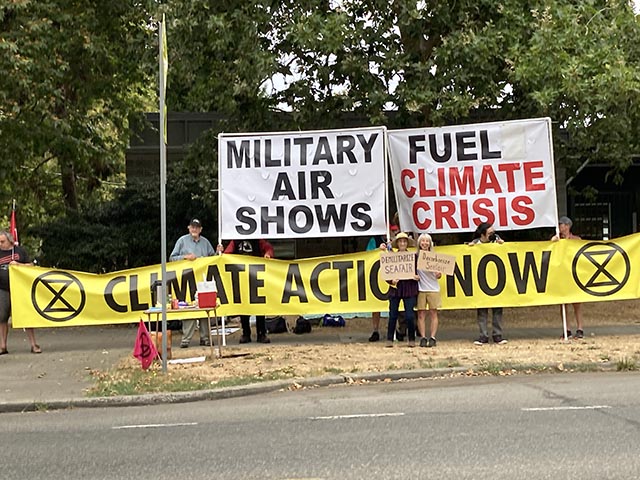
In August, author Iris Antman and Lynn Berry demonstrated against the Blue Angels military air show, at Seattle’s summer Seafair festival.
Photos by: Neal Anderson, Iris Antman, Mary Paterson, Ali Saperstein
The Climate Action Group, at Seattle Insight Meditation Society, is planning an event for early 2024. As the climate crisis daily intensifies, it’s not clear if we’re slowing global warming much less turning it around, even though people around the globe are trying. Our climate group continues to look for ways to address the challenges.
At SIMS (Seattle Insight Meditation Society), we keep in mind that individual actions are only part of what’s needed, and that larger societal changes are imperative. But it still can be empowering to begin addressing the bigger picture, through small changes and actions.

For our spring event we are envisioning a space with multiple “stations,” where participants will learn about ways to reduce their impact on the environment in areas such as housing, transportation, food, and reducing/reusing/recycling. Participants will also learn how to influence policy makers.
As a dharma practitioner and climate activist, I’m aware of the tremendous suffering caused by the unfolding climate catastrophe. The SIMS Climate Action Group was formed nearly six years ago, in an effort to address climate challenges. Using our dharma practice as the ground from which to understand, hold and maybe help, we ask, “How might the dharma inform wise responses to such complicated problems?”
Over the years we’ve hosted discussions, movie nights, forums (in collaboration with Dharma Friendship Foundation), and presented what we learned from the EcoSattva Training we undertook as a group. This was sponsored by One Earth Sangha, a Vipassana-based sangha in Washington, D.C.
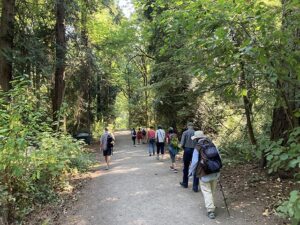
In May 2022 we organized a fundraiser for Green Buildings Now, a local faith-based group working to help low-income building owners decarbonize. The fundraiser was a multimedia jazz performance of The Alaska Suite, highlighting how climate change has and is affecting Alaska. The concert was co-sponsored with 13 other spiritual, religious and environmental groups.
During the event, 150 people filled the main sanctuary of the Seattle First Baptist Church! As we were at that time beginning to emerge from the depths of the pandemic isolation, though we were still masked, it was a joyous occasion. We had a chance to be in community in a sacred space, for an event that brought heartfelt focus to some of the critical issues of our time.
At one of our group’s spring meetings this year, our discussion centered largely on grief due to the deteriorating climate, environment and ecosystems. We turned to Thich Nhat Hanh’s book, “Zen and the Art of Saving the Planet,“ as a guide to quiet our minds and listen to our hearts, breaking.
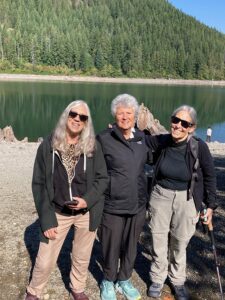
We decided to nurture and nourish ourselves together in the sacred and profound space of the outdoors, which led to four meditation walks in local old-growth forests. In our closing circles participants expressed deep appreciation for the opportunity to walk in meditative silence, through an old-growth forest in the middle of a big city.
Taking time together to be, was an appropriate action for these times.
The climate crisis is a result of the way we live. It is not just one thing, and it is not something that can be easily solved or fixed. The climate crisis is a consequence of how humans live on the planet. It is a result of our socioeconomic, capitalist, consumerist, colonialist systems, which exploit and extract resources from people and the planet, due to our greed, hatred and delusion.
The climate crisis is a result of modernity conditioning us to believe we are separate from each other, other species, the plants and the earth. It is a result of our losing sight of our profound interdependence, and of the need to care for each other and our home.
When I step back I see a really big picture with thousands of interconnecting parts that must be understood as contributors, and solutions, to the climate crisis. So how do I work with the enormity of the challenge, and the limited effect I have?
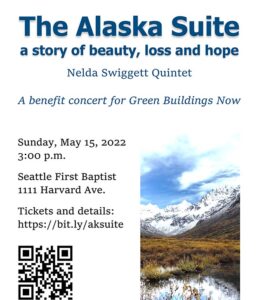
Balancing the relative and absolute levels of engagement
On the relative level I participate in a variety of climate groups addressing different pieces of the puzzle, including public policy such as building codes, energy systems, public health, and public education. I testify at government meetings, write letters, and attend rallies and marches and bank sit-ins. I understand these actions won’t “save the planet,” but they’re important because every action matters. And they sustain me at a fundamental level, bringing a visceral experience of my connection with others.
On the absolute level, I practice the dharma. As much as possible I keep in mind the importance of my intention to use wise action. I try not to impugn the activities of others who I see as causing harm. Instead I try to see their actions as those of people who are caught (as am I), in the delusion of greed and hatred, and in the world of sense pleasures.
I read books from a wide range of authors addressing how the predominant global systems continue with business as usual, seducing us with lifestyles of greed and over-consumption. We do this while the world burns, while we ignore the suffering and poverty of most of the world’s population.
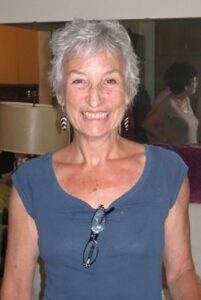
Pope Francis, Dr. William Barber II, His Holiness the Dalai Lama and other spiritual and religious leaders, as well as the U.N. Secretary General, have been clear about how greed and self-centeredness harms. The pope, in his recent treatise “Laudate Deum,” specifically pointed at the U.S. and other materially wealthy countries, whose habits of over-consumption contribute to poverty, starvation, violence and war across the globe.
Religious and spiritual leaders speak about the lack of spiritual grounding in our lives, as a cause or condition for living in ways that are not sustainable. Especially in countries that have greater material resources than others, such as the U.S., it’s easy to continue the pursuit of sense pleasures in the belief that this is where happiness lies.
I am grateful for my dharma practice, which allows me to examine my mind and heart, to see my greed, hatred and delusion. Dharma practice helps me understand my place in the web of life, and how I might continue to learn about, reflect on, and practice with, the choices I make. In the quiet of formal practice, I see the subtle movements of mind toward wanting, becoming, and ill-will, as well as movements toward generosity, compassion, and connection. Every thought and the resulting feeling (vedana) opens or closes my heart, causing tightness or release in my body. The quieter I am, the easier I notice how things move and change, and how everything is connected.
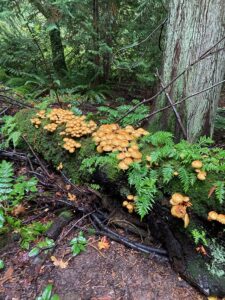
Although I sometimes wonder if I am the only one who bears ill will, who can be petty, who can be greedy, I understand that I am not. Also I understand that what arises in me, arises in others as well. Different causes and conditions lead to different content, but cumulatively our views, understandings and actions create the world we have.
The practice so clearly shows me that happiness does not lie in material objects. Practice also shows me how critical it is that I remember we’re all connected. Mindfulness allows me to consider how my actions (and thoughts and speech) affect others near and far.
None of us knows the answer to the climate predicament, as there is no one answer. What we do know is that wise view and intention, practicing generosity and compassion, and to the best of our ability wise action, are all skillful means. It takes willingness, courage, persistence and humility to discern our place in the web of life.
May we be willing to open to the truth, to have the wisdom and understanding to discern truth. May we have the courage to respond appropriately, to decrease suffering and the causes of suffering in all its manifestations.
Iris Antman has been a Buddhist practitioner for more than 16 years, mostly in the Vipassana/Insight tradition. I’ve done most of the volunteer jobs at Seattle Insight Meditation Society over time, served on the board for three years, recently participated in the Design Task Force for the remodel project, and help facilitate the Climate Action Group.
